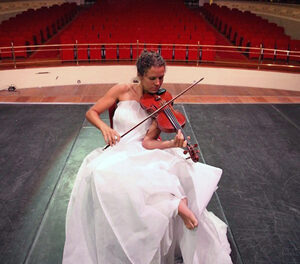Does a large chamber ensemble equate to a large audience? It certainly did Friday night as a sell-out crowd gathered to hear a winning combination of musicians from the Greensboro Symphony Orchestra and the Durham-based Mallarmé Chamber Players. The program featured a mix of two familiar works (although one in an unusual arrangement) and an unknown work by Louis Spohr.
GSO Music Director Dmitry Sitkovesky welcomed the large crowd (and invited folks to sit on some empty chairs on the stage, should someone from the large crowd like that experience — no takers) and explained the genesis of Wagner’s Siegfried Idyll. The tone poem was written as a present by the composer to his 2nd wife Cosima (Liszt’s daughter) after the birth of their son Siegfried. Never mind that no presents were offered for the births of their daughters, who were born earlier. Sitkovetsky explained should the audience read about the Wagner family they would be “horrified and surprised.” Sitkovetsky said he considered this piece to be Wagner’s finest music.
Siegfried Idyll is written for 13 instruments and in this performance the lead violinist was Stefani Collins, the guest soloist who played the Barber Concerto with the GSO Thursday and Saturday. GSO musicians included John Spuller (bass), Debi Pivetta (flute), Ashley Barrett (oboe), Kelly Burke (clarinet), Bob Campbell (horn), and Anita Cirba (trumpet) while the Mallarmé players were Emi Hildebrandt (violin), Suzanne Rousso (viola), Nate Leyland (cello), Jimmy Gilmore (clarinet), Rachael Elliott (bassoon) and Andrew McAfee (horn). Sitkovetsky served as conductor.
This is primarily a tender piece, with wonderful writing for everyone involved. To be sure there are some dark and stormy moments that often lead to rich climaxes. These were presented with drama and tension. But it is the gentle flow and relaxed pace of the work that is so appealing, and these musicians brought the beauty to the fore.
Louis Spohr (1784-1859) was the most popular opera composer in Vienna during the beginning of the 19th century, according to Sitkovetsky. His Nonet for strings and winds featured the players from the Idyll minus Hildebrandt, Burke, Campbell, and Cirba. The classically-infused four movements lasted about 30 minutes.
The opening Allegro begins with material presented by the strings, echoed by the winds; the sound of four strings versus five winds is exploited throughout the piece. The second movement, a dark Scherzo was marvelously performed, with good stealth and drama. The lovely Adagio allowed for the nine musicians each a moment in the spotlight. The Vivace finale was presented with good spirits and not without humor.
Richard Strauss’ Till Eulenspiegel’s Merry Pranks is one of the composer’s most famous tone poems, but I would venture to say that few in the audience had ever heard it in this guise, titled Till Eulenspiegel einmal anders (Another Way). This arrangement (subtitled “as a frolic”) by Franz Hasenohrl is for 5 instruments: violin (Sitkovetsky), bass (Spuller), clarinet (Burke), bassoon (Elliot) and horn (Campbell).
Wow. The entire meat of the tone poem in less than half the time! All five musicians were equal partners in this romp, and each played the part with enthusiasm and accuracy; a great way to end the evening.
This program will repeat in Durham. Please see the sidebar for details.











